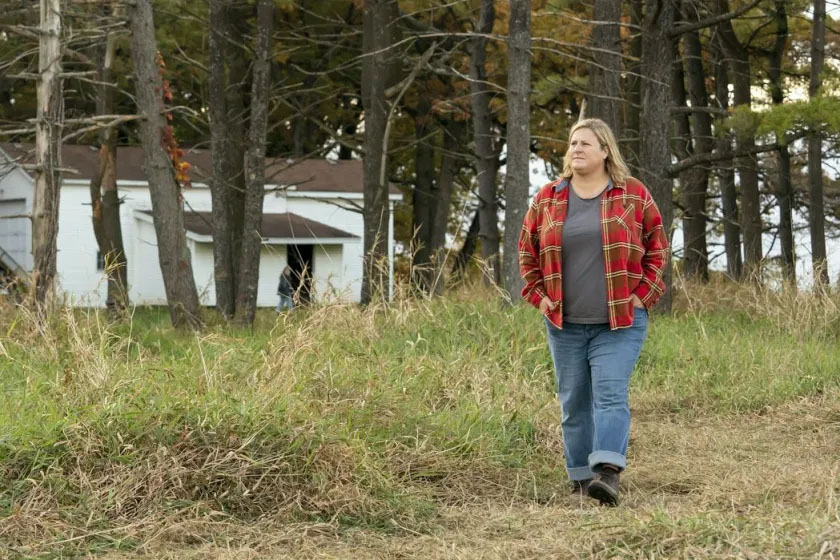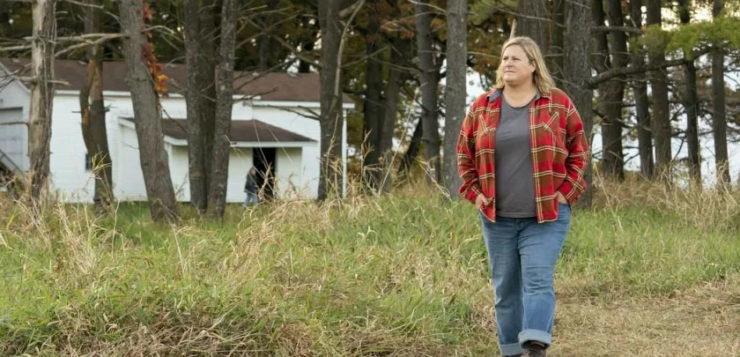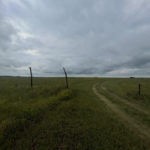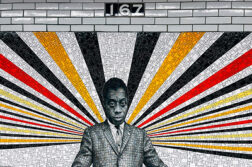
In my first year of grad school, in my hometown of Manhattan, Kansas, I learned that there was scholarship that spoke to the unique experiences of being rural and queer and the potential pride of living as both. As a queer and trans person, I was happy to know that such ideas joining ruralness to queerness existed, that people like me could find meaning in our smaller towns. Kansas is a mostly rural and conservative state, and though there is a queer presence, this can make stories containing queer characters complicated because we believe queer people can only really thrive in big cities. I’m trans, queer, and from the town in HBO’s Somebody Somewhere, and I appreciate the speculative nature of this show and the possibilities it reaches for.
Somebody Somewhere is a 2022 addition to HBO’s platform. The show follows Sam, played by Bridget Everett, and her life in Manhattan, KS. Sam returns home to Manhattan, after many years away, to spend time with one of her two sisters. Unfortunately, we learn in the pilot that this sister has died, leaving Sam in grief. Sam enters the city as a stranger, working at a test-grading center, becoming friends with her coworker, Joel, getting involved in his pro-queer Presbyterian church’s choir, and engaging with her family and their struggles. This show only has one season thus far, but it is already telling a narrative of a complex place with complex people in a way that is complicated and needed.
Somebody Somewhere is speculative for me precisely because it is a fictional telling of a real place that feels so similar to the town I know– one with queer-affirming churches, homophobic evangelicals, new friendships with strangers from high school, and people wondering if happiness can occur for them there. Sam is tempted to find her situation of homecoming to be wholly purgatorial and attempts to place Joel within her misery by making fun of his vision board, which she found when hanging out at Joel’s house. She questions why he would dream of raising children while in a queer partnership, and worse of all, to do it in Kansas. Sam is attacking the future that the vision board is beckoning: a queer one.
This particular scene is haunting to me because Sam names Kansas as a place of impossibility, which is often how I have seen my home. I wonder how many others believe in KS as the land of impossibilities too. Joel pushes back on Sam’s criticism and questions what is wrong with wanting this possible future saying, “we deserve to be happy” to which Sam responds “well, I’m not sure. I don’t know.” Sam and Joel part ways at this point, having me desperately hoping that Sam is wrong and that KS is more than just impossibilities and tarnished vision boards– that there is something to hope for there. The pair eventually reconciles and my hope is restored seeing their burgeoning friendship and the possibility of community in Manhattan, KS that this show yearns for.
The show’s tone is faintly reminiscent of Schitt’s Creek for me. Dan Levy, co-creator of the show, once discussed how homophobia would not be a subject of his show of which Levy said, “[i]f you put something like that out of the equation, you’re saying that doesn’t exist and shouldn’t exist.” Levy’s admission convinces me that Schitt’s Creek was a speculative world-making project, one free of homophobia, that might fit Muñoz’s utopian thought. Homophobia, however, is a subject broached in the pilot of Somebody Somewhere where we learn that Sam’s late sister was queer, owning a “Lez Zepplin” t-shirt. Sam and her other sister, Tricia, get in a fight that partially regards Sam giving said t-shirt to Tricia’s daughter. In this fight we learn that Sam is affirming of her late sister’s queerness and Tricia is not, saying the tired and Christian colloquial “I mean, love the sinner, hate the sin.”
I appreciate Schitt’s Creek’s speculation that challenges assumptions that rural places are exclusively hotbeds for oppressive ideas. I’m thankful for Somebody Somewhere‘s different speculation that discusses some of those oppressive ideas because it allows for a narrative that uses the real complications existent in places like Manhattan, KS, but not to the extent that hope is lost or something that we should not yearn for. I see through Joel’s vision board, the church choir, and Sam and Joel’s friendship that Kansas can be imagined as a place for queer kinship and community making, and can be a place better than that of the “here and now.”
Somebody Somewhere does not entirely condemn the place of Manhattan, KS, nor does it show it to be a utopia, but it does invest in speculative possibility. Somebody Somewhere is fiction, but recollecting feelings bubble in me when I see the B-roll of my former haunts. These feelings are stranger than fiction for me, a trans and queer somebody from somewhere hoping for queer possibilities there and everywhere.
Aislin Neufeldt (they/she) is a writer based in Chicago whose work largely focuses on queerness and the Midwest region of the US. Her work has been featured in Hobart, Trans Bodies, Trans Selves, and Essay Daily and can be found here.







